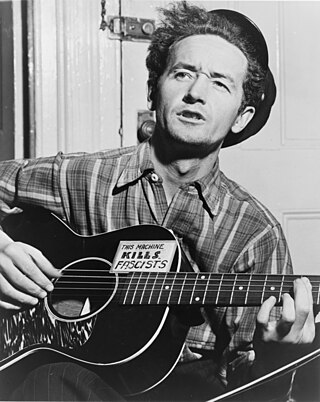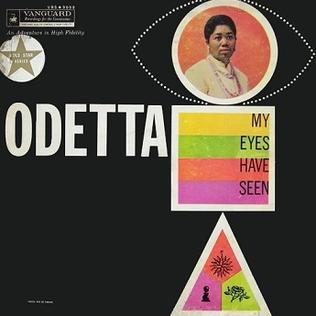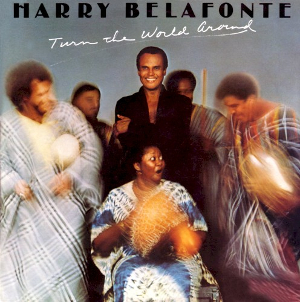
Harry Belafonte was an American singer, actor, and activist, who popularized calypso music with international audiences in the 1950s and 60s. Belafonte earned his career breakthrough with the album Calypso (1956), which was the first million-selling LP by a single artist.

Allan Sherman was an American musician, satirist and television producer who became known as a song parodist in the early 1960s. His first album, My Son, the Folk Singer (1962), became the fastest-selling record album up to that time. His biggest hit was "Hello Muddah, Hello Fadduh", a comic song in which a boy describes his summer camp experiences to the tune of Ponchielli's Dance of the Hours.

Odetta Holmes, known as Odetta, was an American singer, actress, guitarist, lyricist, and civil rights activist, often referred to as "The Voice of the Civil Rights Movement". Her musical repertoire consisted largely of American folk music, blues, jazz, and spirituals. An important figure in the American folk music revival of the 1950s and 1960s, she influenced many of the key figures of the folk-revival of that time, including Bob Dylan, Joan Baez, Mavis Staples, and Janis Joplin. In 2011 Time magazine included her recording of "Take This Hammer" on its list of the 100 Greatest Popular Songs, stating that "Rosa Parks was her No. 1 fan, and Martin Luther King Jr. called her the queen of American folk music."
"Hava Nagila" is a Jewish folk song. It is traditionally sung at celebrations, such as weddings. Written in 1918, it quickly spread through the Jewish diaspora.

Earl Hawley Robinson was a composer, arranger and folk music singer-songwriter from Seattle, Washington. Robinson is remembered for his music, including the cantata "Ballad for Americans" and songs such as "Joe Hill" and "Black and White", which expressed his left-leaning political views. He wrote many popular songs and music for Hollywood films, including his collaboration with Lewis Allan on the 1940s hit "The House I Live In" from the Academy Award winning film of the same name. He was a member of the Communist Party from the 1930s to the 1950s.
"There's a Hole in My Bucket" is a children's song based on a protracted dialogue between two characters, Henry and Liza, about a leaky bucket. Various versions exist but they differ only slightly, all describing a "deadlock" situation essentially as follows: Henry's bucket leaks, so Liza tells him to repair it. To fix the leaky bucket, he needs straw. To cut the straw, he needs a knife. To use the knife, he needs to sharpen it. But the sharpening stone must be damp, so he needs water. But to fetch water, he needs the bucket, which has a hole in it. In honour of the song, people celebrate National Hole in My Bucket Day on May 30 every year.

In the United States, a water boy or water girl was someone who worked in the field, providing water to farm workers in the 19th and early 20th centuries. Today, the name is given to those who work on the sidelines at sports events to provide water for athletes. The phrase has also been used to describe diminutive figures who serve another team or person in the business and political worlds, in a slightly derogatory manner.

Odetta & Larry was a short-lived blues-folk duo in the mid-1950s. It consisted of Odetta and Lawrence B. Mohr, the former of whom became the more well known in ensuing decades.
Jack of Diamonds (a.k.a. Jack o' Diamonds and Jack of Diamonds (Is a Hard Card to Play)) is a traditional folk song. It is a Texas gambling song that was popularized by Blind Lemon Jefferson. It was sung from the point of view of a railroad man who had lost money playing conquian. At least twelve artists recorded the tune before World War II. It has been recorded under various titles such as "A Corn Licker Still in Georgia" (Riley Puckett) and "Rye Whiskey" (Tex Ritter).
"I Know Where I'm Going" is a traditional Scottish ballad about a wealthy love-struck young woman pining for her "bonnie" lover Johnny who some say has a bad reputation. It has been noted since the early nineteenth century. It is Roud number 5701.
A water boy is someone who, in many contexts, such as construction and farm crews, or in sports, provides workers or competitors with water.

The American folk music revival began during the 1940s and peaked in popularity in the mid-1960s. Its roots went earlier, and performers like Josh White, Burl Ives, Woody Guthrie, Lead Belly, Big Bill Broonzy, Richard Dyer-Bennet, Oscar Brand, Jean Ritchie, John Jacob Niles, Susan Reed, Paul Robeson, Bessie Smith, Ma Rainey and Cisco Houston had enjoyed a limited general popularity in the 1930s and 1940s. The revival brought forward styles of American folk music that had in earlier times contributed to the development of country and western, blues, jazz, and rock and roll music.
"Keep Your Eyes on the Prize" is a folk song that became influential during the American Civil Rights Movement of the 1950s and 1960s. It is based on the traditional song, "Gospel Plow," also known as "Hold On," "Keep Your Hand on the Plow," and various permutations thereof.

Avery Robinson was an American classical composer who worked with, among others, Roland Hayes and Paul Robeson.

My Son, the Folk Singer is an album by Allan Sherman, released by Warner Bros. Records in 1962. On the album sleeve, the title appears directly below the words "Allan Sherman's mother presents."

Belafonte Returns to Carnegie Hall is a live double album by Harry Belafonte. It is the second of two Belafonte Carnegie Hall albums, and was recorded May 2, 1960. It peaked at No. 3 on the Billboard Pop albums charts.
Odetta's discography is large and diverse, covering over 50 years and many record labels.

My Eyes Have Seen is a studio album by American folk singer Odetta, first released in July 1959. It is the first record by Odetta to be released by Vanguard Records.

The Best of the Vanguard Years is a compilation album by American folk singer Odetta, originally released in 1999.

Turn the World Around is an album by American singer Harry Belafonte, released in 1977.













